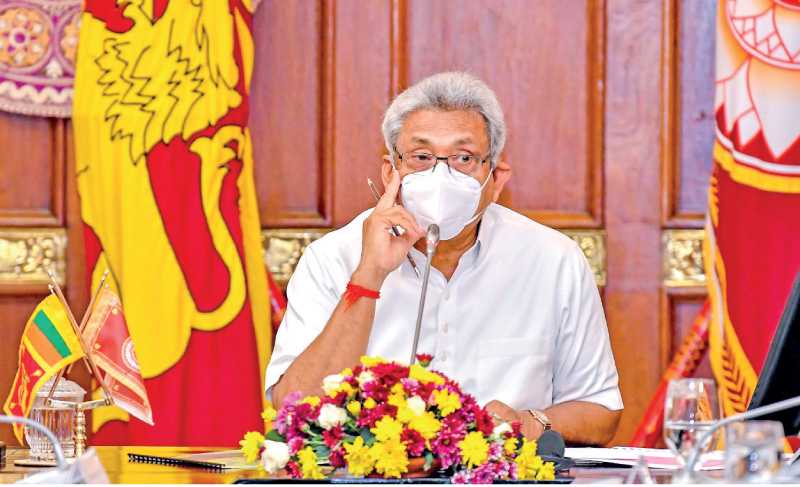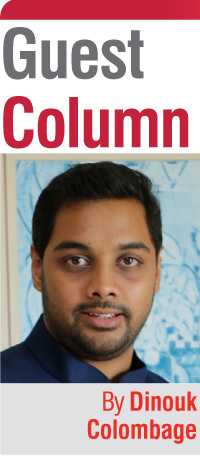Wednesday Feb 25, 2026
Wednesday Feb 25, 2026
Thursday, 17 December 2020 00:00 - - {{hitsCtrl.values.hits}}

Many have begun to question whether they were duped into believing this Government was in fact the forceful administration they needed
“In any moment of decision, the best thing you can do is the right thing. The worst thing you can do is nothing” – Theodore Roosevelt 26th President of the USA
 A decisive Government was what the Sri Lankan public clamoured for at the 2019 Presidential Election. On the back of claims that the Yahapalanaya administration had been too slow in implementation and plagued by divisions between the President and the Cabinet, the public looked to Gotabaya Rajapaksa as the ‘strongman’ leader they needed.
A decisive Government was what the Sri Lankan public clamoured for at the 2019 Presidential Election. On the back of claims that the Yahapalanaya administration had been too slow in implementation and plagued by divisions between the President and the Cabinet, the public looked to Gotabaya Rajapaksa as the ‘strongman’ leader they needed.
With a commanding mandate, and a sweeping victory at the subsequent General Election, the President and his Government have been empowered to proceed with their plans despite any obstacles that may arise. However, the definitive leadership that was expected from this regime has been found wanting. Faced with a global pandemic, a faltering economy and a divided cabinet, the Government is facing a growing pile of issues that require urgent attention.
Countries around the world are preparing to move past COVID-19 in the New Year and begin their recovery process. Priority has been given to securing and distributing a vaccine for the virus. Government regulatory bodies have been tasked with providing the necessary approvals for the vaccines now available on the market.
However, in Sri Lanka the Government is still to publicly present their plans for the distribution of a vaccine and the post-COVID-19 recovery.
Last week Kegalle was the scene of crowds numbering the thousands thronging to a local Ayurvedic doctor’s clinic for what he claims to be a cure for the virus. Despite no proper approvals being handed out for the medicine the authorities were slow to react to the issue. The large crowds saw a complete disregard for the regulations imposed to halt the spread of the virus, and the police appeared helpless in controlling the public. This issue was first given prominence when Health Minister Pavithra Wanniarachchi publicly consumed this medicine, thereby giving the impression that it was an approved course of medication. This coupled with an absence of any future plans to introduce a COVID-19 vaccine to the country, led to the desperation displayed by the public in clamouring for the purported cure. Conflicting statements by members of the Government has only fuelled the confusion in regards to the future availability of any medicine. State Minister of Indigenous Medicine Sisira Jayakody has claimed that the proposed Ayurvedic cure had received approval from his Ministry. The Prime Minister has since instructed the National Research Council to study these supposed cures and report back on their suitability. He has further requested that a report be presented to the Government in regard to the vaccines being used around the world. However, there is still to be a conclusive decision taken in regard to this medical matter.
Of course, all this has taken place against the backdrop of the Minister of Health claiming that Sri Lankans will receive a vaccine only once the World Health Organisation (WHO) provides its approval. The WHO does not provide approvals for vaccines, but simply assists countries in applying safety standards in the administration of proposed medicines. The onus is on the country’s medical authorities to approve the vaccine themselves.
The three conflicting statements from these members of the Government have only fuelled further speculation. The administration’s inability to decide on the best course of action in regard to the vaccine will continue to see continual promotion of ‘miracle cures’ against the virus. This will only result in further debacles such as what was seen last week.
Of course, the indecisiveness of the Government has extended beyond the COVID-19 pandemic and into the political spheres. This week the Cabinet discussed the long overdue Provincial Council (PC) elections. The meeting appeared to have ended with a lack of consensus, with reports emerging that members were divided over whether or not it should be held. Under the Yahapalanya Government elections were delayed on the basis that the electoral system was to be changed. However, the presence of a hung Parliament had stalled the process, with no side being able to agree on the necessary legislative amendments.
Under the Rajapaksa Government, opinion towards the PCs have remained divided. Prominent members have found themselves at odds over the necessity of the Councils. The State Minister of Provincial Councils and Local Government Sarath Weerasekara had publicly announced that a study would be carried out into the PCs to decide whether they should be amended or abolished. However, the Minister of Public Services, Provincial Councils and Local Government Janaka Bandara Tennakoon presented the cabinet paper this week which proposed that the PC elections be held at the beginning of next year.
With the Cabinet unable to make a decision either way, the administration has referred the topic to a meeting of the Party Leaders. With the Party Leaders having already demonstrated an inability to decide on the matter, it raises the question as to why the Government will not make a determination with the backing of the mandate they received at the recent elections.
Pundits will argue that the reluctance on the part of the Government to make a decision is fuelled by the political divisions. On the one hand a rising star in the Government ranks is Weerasekara, having obtained the highest number of preferential votes in Colombo he is considered a close confidante of the President. While on the other side is India who will no doubt continue to pressure the Government to hold the PC elections. Of course, the inability of the Government to make a decision will only alienate them with the minority communities, who consider the PCs an essential arm in their representation on the political platform.
The political divisions that have fed the Government’s indecisiveness have extended their inaction beyond the PCs and encroached upon the fundamental rights of the public. A major issue that has dominated the news headlines these past few weeks has been the forced cremations of the COVID-19 positive patients. Since April this year the Muslim community has condemned the Government’s decision to cremate all those who have died from the virus. Citing the WHO guidelines, the community has claimed that there is no risk of the transmission of the disease into any ground water from a dead body. However, the fact that this matter was raised and promoted by politicians courting the Muslim vote has seen the Government adopt an uncompromising stance.
Despite the Government continuing to enforce cremations of those who have died from the virus the Prime Minister has indicated that alternative arrangements should be provided for those who wish to have their loved ones buried. Yet there is still to be a firm decision made in regard to this matter. The inability of the Government to make a decision has opened up the country to ridicule on the international stage. Earlier this week the President of Maldives extended an offer to the Government to provide land for the burial of Sri Lankan Muslims. For a nation made up of small islands which were until recently facing the very real threat of sinking, the offer from the Maldivian Government highlights the ridiculousness of the Government’s tentative approach towards this politically sensitive topic.
Provided with the necessary tools to make the hard decisions, the Government’s unsettled approach to matters of national importance has raised eyebrows amongst the public. Many have begun to question whether they were duped into believing this Government was in fact the forceful administration they needed. Political divisions appear to have left President and his Cabinet at a continuous crossroad; the question that now needs answering is whether the leadership will be capable of taking the reins and making the hard decisions.